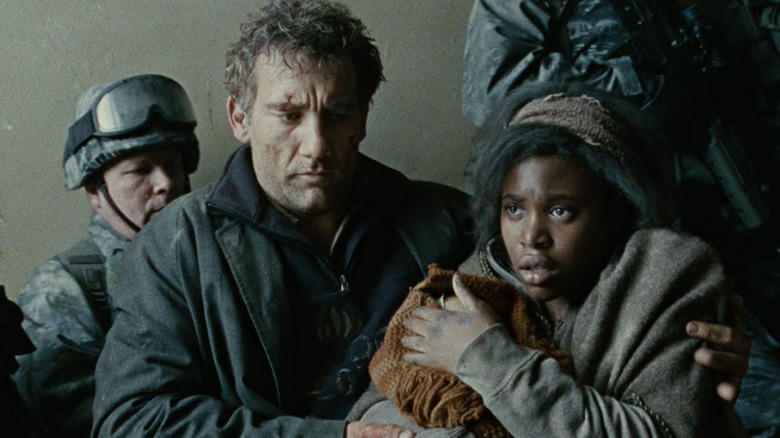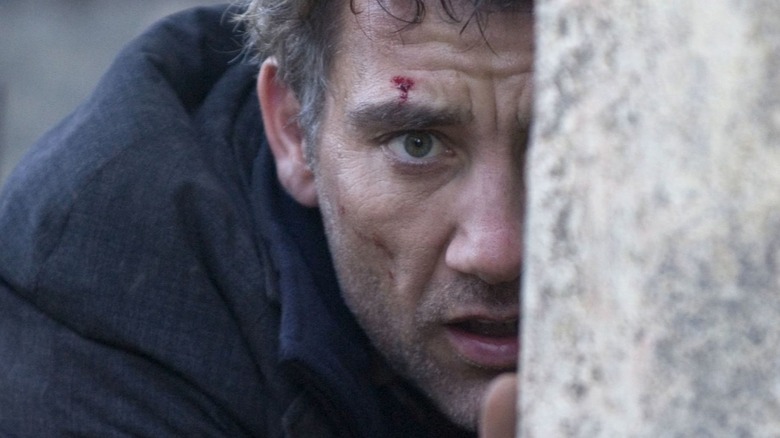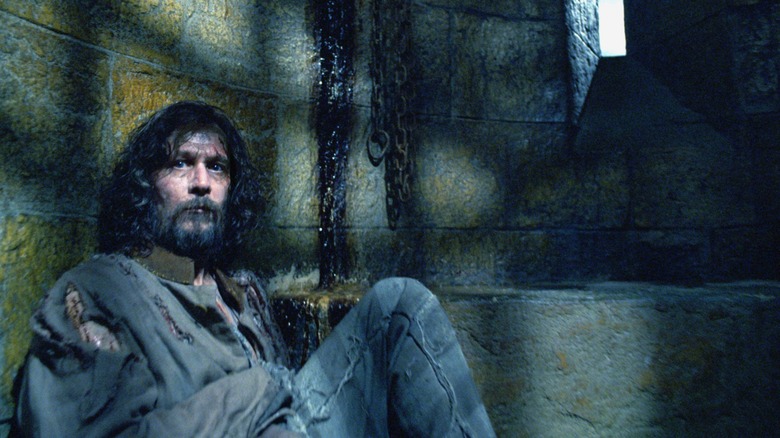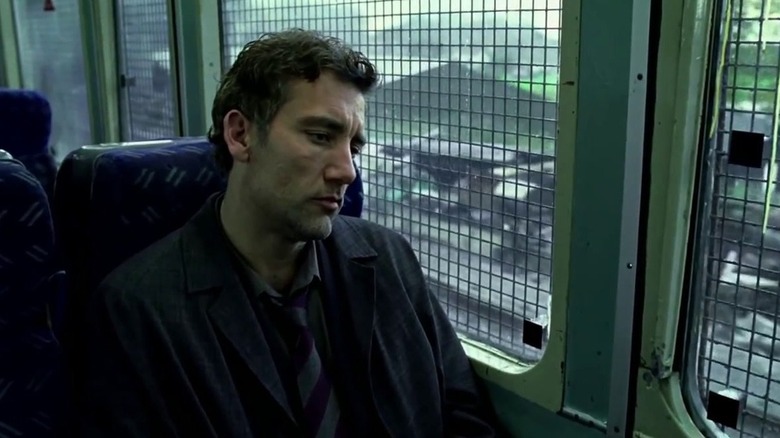How Harry Potter Saved Children Of Men From Getting Scrapped For Good
For a movie that fits firmly in the dystopian sci-fi genre, Alfonso Cuarón's 2006 film "Children of Men" makes for one of the most truly terrifying films ever. In a world (London, 2027) where infertility has been the law of the land for eighteen years and resources have dwindled, humanity has turned on itself. It's like the grimmest of '70s science fiction films, only made by a master filmmaker at the peak of his powers. While it might have taken a tragedy for him to become committed to the film, his passion is evident in every frame.
More than anything out of the ordinary, the movie's vision of London looks distressingly normal, with office workers attending to business as usual despite chaos and bombings. As a television PSA seen early on notes, "Only Britain Soldiers On." The movie opens with the death of an 18-year-old, the world's youngest person. And things just get more hopeless from there, following disillusioned Theo (Clive Owen) as he attempts to protect the first pregnant woman (Clare-Hope Ashitey) the world's seen in decades.
Cuarón began preparing "Children of Men" following the release of his 2001 film "Y tu mamá también," but there was no way to fast-track the film into production. It wasn't as if the P. D. James novel on which it was based had the ingredients of a crowd-pleaser. Discussions around the movie's making were usually fruitless, with Cuarón's typical artistry facing headlong against the demands of studio executives. Such tension typically spelled death for more ambitious sci-fi films, and it would have likely happened to "Children of Men." Luckily, Cuarón was able to find another job that would keep "Children of Men" alive: directing "Harry Potter and the Prisoner of Azkaban."
Too bleak to get made
"Children of Men" was going to be an incredibly expensive arthouse film. There was no way around its bleak environment or its tragic, but optimistic, ending. The final budget for the movie was $76 million according to Box Office Mojo, a high bar for a movie as grim as this. The world as director Alfonso Cuarón envisioned it would be incredibly detailed and thought-out, and everything would be of a piece. Despite the movie's suspenseful edge, it has the feeling of a documentary delivered directly from the future. Unlike most future movies, there wouldn't be any high-tech gizmos.
There would be action scenes, but nothing cathartic, certainly nothing in the vein of the crime films for which lead actor Clive Owen was becoming known. Moreover, the director was experimenting with progressively longer and more complex single-shot sequences where the camera movement would be relatively subtle and unflashy. How exactly do you sell a movie like "Children of Men"?
The answer is that you don't. Producers Eric Newman and Marc Abraham, according to a 2016 Vulture retrospective on the movie, had a hard time getting Universal to agree to make the movie. Nobody involved with the movie, most especially Cuarón, would be willing to compromise on the vision once it had been established. And as the movie languished in development stasis, Cuarón was given an amazing opportunity. He was sought out by Warner Bros. for a franchise entry in one of their biggest properties of the early 2000s, the "Harry Potter" series, which was in need of a director with the departure of director Chris Columbus.
A darker take on Harry Potter
In many ways, the "Harry Potter" series of films didn't seem to really come into its own until the third entry, "Harry Potter and the Prisoner of Azkaban." The first two entries were handsomely mounted kids' movies, but the direction by Chris Columbus seemed to prioritize the excellent production design of Stuart Craig over anything else. And both movies repeated the stories of their respective books to the point of redundancy, with little in the way of condensation or true adaptation. But "Prisoner of Azkaban" changed that, and much of it could be owed to new director Alfonso Cuarón.
The director had worked in a number of genres, even conquering the family film with 1995's "A Little Princess," but this kind of franchise work looked aberrant from the outside. Cuarón crafted a darker palette with "Azkaban," giving the whimsical gags of previous movies a harder edge. In his movie, every little magical detail would be heightened past the point of enchantment into something threatening. Many of the book's less relevant subplots were excised by returning screenwriter Steve Kloves, and Cuarón used the book's primary hook — vengeful killer Sirius Black (Gary Oldman) escaping from jail to come after Harry (Daniel Radcliffe) — to make the film feel like a thriller for kids. And no expense was spared for the movie's parade of chilling children's choirs, monsters, prophecies, and time travel.
Under the direction of Cuarón it earned its consensus placement as the series' finest entry. But in many ways it was a distraction from his real passion project, the not-so-distant dystopian future of "Children of Men." It also kept that film alive.
Coming out of a franchise unscathed
As Alfonso Cuarón set about working on "Prisoner of Azkaban," the team behind "Children of Men" worried that their project, with years of work behind it, was set to fall apart. Producer Eric Newman recalled to Vulture that his immediate thought was "That's the end. Nobody ever comes back from a franchise."
But Cuarón did come back. And he spent his time on "Azkaban" thinking more and more about "Children of Men." It wasn't as if he was just scraping by making his "Harry Potter" movie — like most of his movies it was very clearly a work of passion. But over the course of that movie's production, "Children of Men" never left his mind, as he told Vulture. "I was in London full-time, going through not the prettiest side of London," he said, giving him a greater idea of the anxieties that "Children of Men" could address.
Without Cuarón to defend the movie to Universal, the project had largely been abandoned by Universal, although there was regular work done on the scripting level, by Tim Sexton and later David Arata, to keep the project afloat. In doing so, they ensured that Cuarón could immediately step out of the high-stakes "Harry Potter" world into "Children of Men."
Suddenly, the director who had argued with Universal executives for his vision was behind the second-biggest worldwide film of 2004, per Box Office Mojo. And the studio, who had possibly justifiable cold feet about giving Cuarón such a massive budget to make "Children of Men," decided to change course. Rather than get lost in the franchise morass, Cuarón used his newfound success to cash a blank check — and gave the world a prescient, shocking, beautiful sci-fi film for all time, even if its box office was lackluster.



